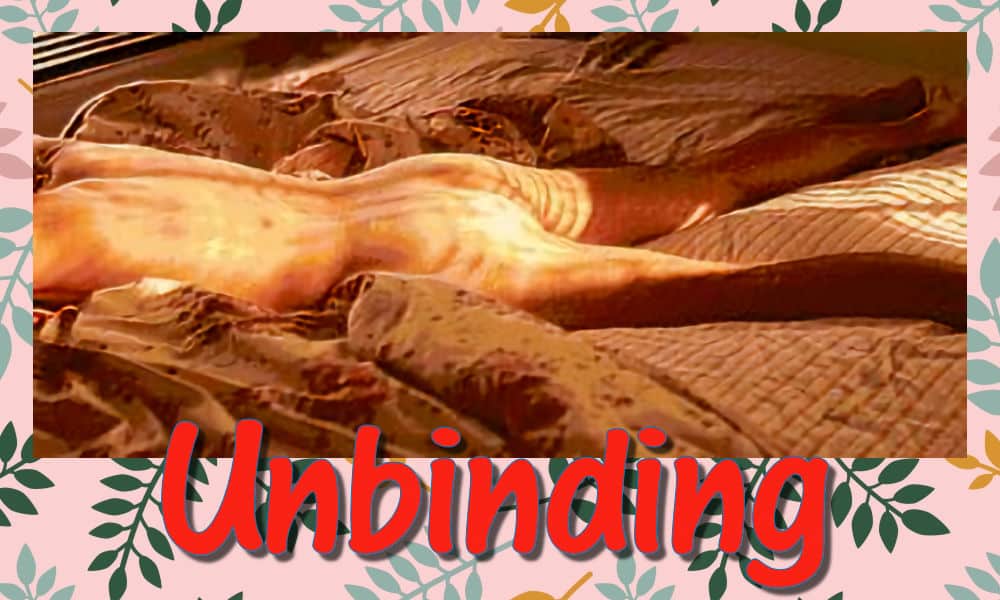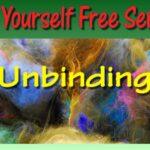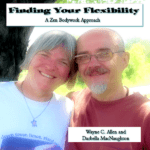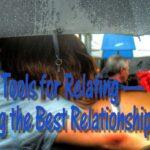- Untwisting
- Getting out of Bondage
- Unbinding — letting go of tightness
- Body Gates and the Path to Self-Knowing
- My Husband and My Pelvis
- Drama and Being Twisted
Unbinding — Bodywork is all about disentangling yourself from your wacky thoughts. We all have them. Blaming, chiding, criticizing, ornery thoughts.
The word of the year
Several years ago, I picked my “word for 2010,” which was “unbinding.” I decided on “unbinding” as an expression of nirvana - a state of being that is devoid of clinging, perturbations, and knottiness.
Unbinding comes from one definition of this hard-to-define word. (see wikipedia)
Nir, (means “knot”) + va-na, (means “weaving”,) = “freedom from the knot of the distressful thread of karma.”
Unbinding. Unknotting. Untangling.
So, the wise soul asks, “Unbound from what?”
Unbinding oneself from the allure of mind trips by joining the mind with the body in the here and now.
In the last article I mentioned that true vulnerability is a byproduct of escaping from the trap of endless mental games and descriptions, into the realm of action. And this seems to me to be the ultimate unbinding.
Oh. By the bye, notice that the word is unbinding, not unbound. This is a process. We learn how to unbind ourselves, and then continue to do so, until we die. It’s not one time, game over.
This is not a quick fix — quick fixes aren’t, and don’t!
Most people I know live in their heads, and have only a nodding (couldn’t resist…) acquaintance with their bodies. And in this article, I don’t even really want to talk about doing bodywork.
I want to talk about how sad it is when one is caught in one’s stories.

Oh, the twists and turns a tangled mind is capable of. It’s like a rat’s nest up there. Some people alternately love and hate their spouse. Back and forth, back and forth.
“She” says she wants communication, and all she does is judge. She says she wants fun, and all she does is blame.
“He” gets tired and pushes back, and she gets harsher.
He pulls in and acquiesces, and she decides to stay, as she’s convinced he’s finally trainable.
And nothing changes, as this loop is ingrained in both of them, and they “enjoy” the drama.
Others get caught in a “I’m a failure,” or “I’m not good enough” loop. Others, in an “I’ll never have a successful (relationship, career, family. etc.)” loop. And the odd thing? All that’s happening is that they are on a hunt.
For what, you ask? More “evidence” to support their preconceived notions.
Makes you wonder: why collect evidence to support what you say you don’t want? Answer: because they DO, at some level, want to confirm their tale of woe. Much better than the risk and insecurity of striking off on an uncharted walk.
And there lies the rub.
Despite the obviousness of this, let me state:
Thinking about doing things differently is being caught - entangled, bound, because thought — thinking, pondering, reflecting, all change nothing.
Griping, complaining, demanding rescue, demanding that the world change — changes nothing.
Doing something different? That changes things. It’s the only thing that does.
Change comes at a price, and the price is actually doing something. In most cases, it’s doing what you say you’ll do.
- If you say you are going to communicate using a model, you do so.
- If you say you are going to start a project, you start it.
- If you say you’re going to treat your grown kids as adults, you do it.
No griping, no whining about how hard change is. No blaming your parents for inadequate training in getting a life.
Unbinding is stopping doing what does not work, while doing what does.

Unbinding is disentangling yourself from your wacky thoughts. We all have them. Blaming, chiding, criticizing, ornery thoughts.
On and on, like a broken record. They mean nothing, and are just chatter, unless you choose to make them the centerpiece in a meaningless life. Then, they take on a life of their own.
The next time you feel bound, tight, caught, have a breath. Move your attention to the tightness, hotness, coldness, dryness, or wetness in your body. Ask yourself, “What is this? What does my body want?”
Mostly, if you listen, you’ll hear, “Do something! Move me, shake me, use me!” Those aches and pains have been caused by you, as you forced your body into submission and surrender, and yet on it fights, sending you messages, trying to get your attention, cajoling you to act differently.
Go out of your mind, and come to your senses.
Fritz Perls
Unwrap their arms from your chest, unlock your legs, and open yourself to the world. Become free of boundedness, and open to possibilities. From this stance of vulnerability, it is possible, very possible, to take a tentative step or two into another reality. But only if you unbind yourself, and then take a step.
What story are you using to stay bound? What would it be like to unbind yourself? What fear-based story do you tell to stay stuck? What would it be like to tell yourself a more interesting story?
What would it be like, to let your body work?






